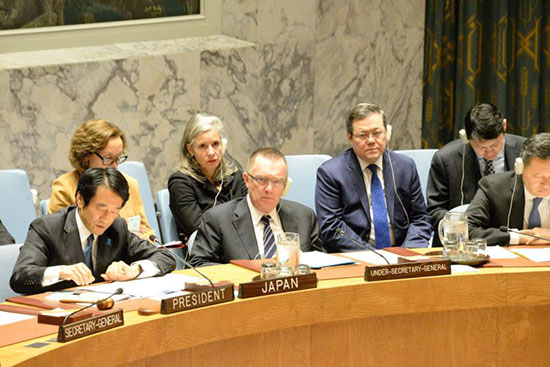


UN Security Council officials listen to statements on the Myanmar issue on December 13, 2017. Photo: Yin Miao

UN Security Council addresses the Myanmar issue at UN Headquarters in New York, December 12, 2017. Photo: Yin Miao
New York (People’s Daily) - United Nations Security Council members were briefed on the Rakhine State during its meeting on the situation in Myanmar, on December 12 at UN Headquarters in New York City.
Under-Secretary-General for Political Affairs, Jeffrey Feltman, delivered the latest developments highlighting the bilateral agreement between Bangladesh and Myanmar reached on November 23.
Last month's agreement recognized the need for a comprehensive and long-term solution through the safe, dignified, and voluntary return in accordance with international law.
“The United Nations can help Myanmar to defuse inter-communal tensions and create an environment for safe and dignified repatriation of Rohingya refugees,” Feltman said the number of refugees that have entered Bangladesh from Myanmar since August has reached over 600,000.
“China has repeatedly stated its position condemning the violent attacks and has supported Myanmar's efforts in maintaining domestic stability since the outbreak of the violence in the Rakhine State in Myanmar,” said Wu Haitao, China Ambassador to the UN.
“China is a friendly neighbour to Myanmar and Bangladesh. On one hand, we provide emergency humanitarian aid to the two countries for the proper placement of displaced people; and on the other hand, we are actively engaging the two countries to solve the issue through dialogue and consultation,” stressed Wu.
Wu also discussed China Foreign Minister Wang Yi’s recent visits to Bangladesh and Myanmar and his "three-phase" Rakhine plan.
“The first phase is to achieve the only solution to the situation in the region and to restore a stable order so everyone there can enjoy peace. And this goal has largely been achieved. The crux of the matter is that no further repetition should take place. In particular, the war cannot be resumed."
“During the second phase, the signed the repatriation agreement should be utilized to achieve desired results. While the third phase will address poverty,” said Wu, calling upon the international community for added assistance.
“Humanitarian aid has arrived, and both sides signed the repatriation agreement. Myanmar is actively working fulfil responsibilities addressed in the report from the Rakhine State Advisory Commission,” added Wu.
Historically, the Rakhine State has always been complex both in terms religion and regional ethnicity.
Wu said an overnight solution was not possible as the Rakhine issue, “should be handled properly by Myanmar and Bangladesh through bilateral channels,” and added that outside influence would only temporarily ease the situation.
“The Rakhine State has shown positive change. China hopes that both Myanmar and Bangladesh will continue to implement necessary measures and hopes that the UN Security Council and the international community will play a constructive role,” said Wu.

 Award-winning photos show poverty reduction achievements in NE China's Jilin province
Award-winning photos show poverty reduction achievements in NE China's Jilin province People dance to greet advent of New Year in Ameiqituo Town, Guizhou
People dance to greet advent of New Year in Ameiqituo Town, Guizhou Fire brigade in Shanghai holds group wedding
Fire brigade in Shanghai holds group wedding Tourists enjoy ice sculptures in Datan Town, north China
Tourists enjoy ice sculptures in Datan Town, north China Sunset scenery of Dayan Pagoda in Xi'an
Sunset scenery of Dayan Pagoda in Xi'an Tourists have fun at scenic spot in Nanlong Town, NW China
Tourists have fun at scenic spot in Nanlong Town, NW China Harbin attracts tourists by making best use of ice in winter
Harbin attracts tourists by making best use of ice in winter In pics: FIS Alpine Ski Women's World Cup Slalom
In pics: FIS Alpine Ski Women's World Cup Slalom Black-necked cranes rest at reservoir in Lhunzhub County, Lhasa
Black-necked cranes rest at reservoir in Lhunzhub County, Lhasa China's FAST telescope will be available to foreign scientists in April
China's FAST telescope will be available to foreign scientists in April